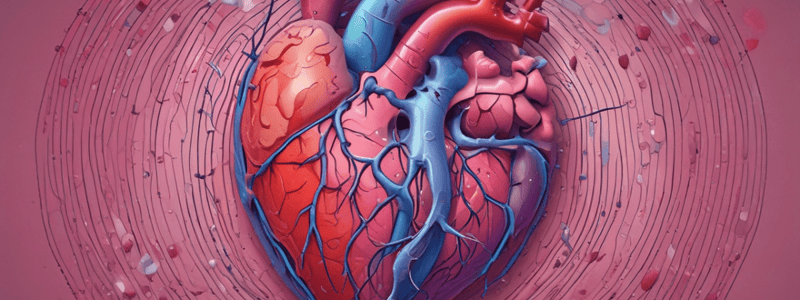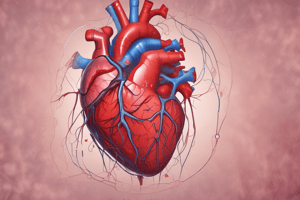Podcast
Questions and Answers
What is the primary focus of early treatment of heart failure, and which classes of drugs are used to achieve this goal?
What is the primary focus of early treatment of heart failure, and which classes of drugs are used to achieve this goal?
Reducing the effects of the renin-angiotensin-aldosterone system and the sympathetic nervous system; ACE inhibitors, ARBs, and certain beta blockers.
What is the role of loop diuretics in the treatment of heart failure, and when are they typically used?
What is the role of loop diuretics in the treatment of heart failure, and when are they typically used?
To reduce symptoms of heart failure secondary to fluid overload; typically used in conjunction with other medications.
What is the primary indication for using aldosterone inhibitors in the treatment of heart failure?
What is the primary indication for using aldosterone inhibitors in the treatment of heart failure?
As the heart failure progresses.
What is the role of digoxin in the treatment of heart failure, and when is it typically added to the treatment regimen?
What is the role of digoxin in the treatment of heart failure, and when is it typically added to the treatment regimen?
What is the classification of heart failure that is characterized by marked limitation of physical activity, with symptoms occurring even at rest?
What is the classification of heart failure that is characterized by marked limitation of physical activity, with symptoms occurring even at rest?
What is the mechanism of action of positive inotropic drugs in the treatment of heart failure?
What is the mechanism of action of positive inotropic drugs in the treatment of heart failure?
What is the role of beta blockers in the treatment of heart failure, and which type of beta blocker is commonly used?
What is the role of beta blockers in the treatment of heart failure, and which type of beta blocker is commonly used?
What is the role of angiotensin receptor-neprilysin inhibitors (ARNIs) in the treatment of heart failure?
What is the role of angiotensin receptor-neprilysin inhibitors (ARNIs) in the treatment of heart failure?
What is the mechanism of action of phosphodiesterase inhibitors in the treatment of heart failure?
What is the mechanism of action of phosphodiesterase inhibitors in the treatment of heart failure?
What is the specific ethnic group for which Hydralazine/isosorbide dinitrate (BiDil) is approved?
What is the specific ethnic group for which Hydralazine/isosorbide dinitrate (BiDil) is approved?
What is the structural similarity of Dobutamine to another drug?
What is the structural similarity of Dobutamine to another drug?
What is the name of the only available phosphodiesterase inhibitor?
What is the name of the only available phosphodiesterase inhibitor?
What is the indication for phosphodiesterase inhibitors in the treatment of heart failure?
What is the indication for phosphodiesterase inhibitors in the treatment of heart failure?
What is the mechanism of action of aldosterone antagonists in the treatment of heart failure?
What is the mechanism of action of aldosterone antagonists in the treatment of heart failure?
What is the effect of spironolactone on potassium levels?
What is the effect of spironolactone on potassium levels?
What is the class of drugs that inodilators belong to?
What is the class of drugs that inodilators belong to?
What is the primary mechanism of action of ACE inhibitors in the treatment of heart failure?
What is the primary mechanism of action of ACE inhibitors in the treatment of heart failure?
What is the unique feature of hydralazine/isosorbide dinitrate (BiDil) compared to other heart failure medications?
What is the unique feature of hydralazine/isosorbide dinitrate (BiDil) compared to other heart failure medications?
What is the common adverse effect of lisinopril that is NOT typically seen with ARBs?
What is the common adverse effect of lisinopril that is NOT typically seen with ARBs?
What is the primary effect of ARBs on the cardiovascular system?
What is the primary effect of ARBs on the cardiovascular system?
Why are ARBs less likely to cause hyperkalemia compared to ACE inhibitors?
Why are ARBs less likely to cause hyperkalemia compared to ACE inhibitors?
What is the primary indication for using lisinopril?
What is the primary indication for using lisinopril?
What is the difference in the effect of ARBs on potassium levels compared to ACE inhibitors?
What is the difference in the effect of ARBs on potassium levels compared to ACE inhibitors?
What is the primary advantage of using ARBs over ACE inhibitors in terms of adverse effects?
What is the primary advantage of using ARBs over ACE inhibitors in terms of adverse effects?
What is heart failure and what are its symptoms?
What is heart failure and what are its symptoms?
What are the common causes of heart failure?
What are the common causes of heart failure?
What are the stages of heart failure according to the American College of Cardiology Foundation/American Heart Association?
What are the stages of heart failure according to the American College of Cardiology Foundation/American Heart Association?
What are the New York Heart Association stages of heart failure?
What are the New York Heart Association stages of heart failure?
What is the primary goal of heart failure treatment?
What is the primary goal of heart failure treatment?
What is the therapeutic range for digoxin dosing?
What is the therapeutic range for digoxin dosing?
What are the common adverse effects of cardiac glycosides like digoxin?
What are the common adverse effects of cardiac glycosides like digoxin?
What is the primary treatment for digoxin toxicity?
What is the primary treatment for digoxin toxicity?
What is the combination of medications in Valsartan/Sacubitril, and what is its primary indication?
What is the combination of medications in Valsartan/Sacubitril, and what is its primary indication?
What is the mechanism of action of Angiotensin Receptor-Neprilysin Inhibitors (ARNI)?
What is the mechanism of action of Angiotensin Receptor-Neprilysin Inhibitors (ARNI)?
What is the cardioprotective quality of beta blockers, and how do they achieve this?
What is the cardioprotective quality of beta blockers, and how do they achieve this?
What is the primary action of aldosterone antagonists in heart failure, and how do they achieve this?
What is the primary action of aldosterone antagonists in heart failure, and how do they achieve this?
What is the common adverse effect of Valsartan/Sacubitril, and how does it relate to its mechanism of action?
What is the common adverse effect of Valsartan/Sacubitril, and how does it relate to its mechanism of action?
What is the primary indication for using beta blockers in heart failure, and which specific medications are used?
What is the primary indication for using beta blockers in heart failure, and which specific medications are used?
What is the primary effect of beta blockers on the heart, and how does it relate to their mechanism of action?
What is the primary effect of beta blockers on the heart, and how does it relate to their mechanism of action?
What is the primary concern for using Valsartan/Sacubitril in certain patient populations, and why is it essential to consider this?
What is the primary concern for using Valsartan/Sacubitril in certain patient populations, and why is it essential to consider this?
Flashcards are hidden until you start studying
Study Notes
Heart Failure Classification
- Class I: No limitations of physical activity; ordinary physical activity does not cause symptoms of heart failure.
- Class II: Slight limitations of physical activity; comfortable at rest, but ordinary physical activity results in symptoms of heart failure.
- Class III: Marked limitation of physical activity; comfortable at rest, but less than ordinary activity causes symptoms of heart failure.
- Class IV: Unable to have physical activity without symptoms of heart failure, or symptoms at rest.
Drug Therapy for Heart Failure
- Positive inotropic drugs: increase the force of myocardial contraction
- Positive chronotropic drugs: increase heart rate
- Positive dromotropic drugs: accelerate cardiac conduction
- Types of positive inotropic drugs:
- Phosphodiesterase inhibitors
- Cardiac glycosides
- Sinoatrial modulators
- Angiotensin receptor-neprilysin inhibitors (ARNI)
- Angiotensin-converting enzyme (ACE) inhibitors
- Angiotensin receptor blockers (ARBs)
- Beta blockers
- Diuretics
Drugs of Choice for Early Treatment of Heart Failure
- Focus on reducing effects of the renin-angiotensin-aldosterone system and the sympathetic nervous system
- ACE inhibitors (e.g., lisinopril, enalapril, captopril)
- ARBs (e.g., valsartan, candesartan, losartan)
- Certain beta blockers (e.g., metoprolol, carvedilol)
- Loop diuretics (e.g., furosemide) to reduce symptoms of HF secondary to fluid overload
- Aldosterone inhibitors (e.g., spironolactone, eplerenone) added as HF progresses
- Digoxin added only after these drugs are used
Aldosterone Antagonists
- Spironolactone (Aldactone): potassium-sparing diuretic and aldosterone antagonist shown to reduce symptoms of HF
- Eplerenone (Inspra): selective aldosterone blocker, blocking aldosterone at its receptors in the kidney, heart, blood vessels, and brain
Miscellaneous Drugs to Treat Heart Failure
- Hydralazine/isosorbide dinitrate (BiDil): first drug approved for a specific ethnic group (Blacks)
- Dobutamine: beta1-selective vasoactive adrenergic drug; structurally similar to dopamine
Phosphodiesterase Inhibitors (PDIs)
- Work by inhibiting the enzyme phosphodiesterase
- Result in:
- Intracellular increase in cAMP
- Positive inotropic response
- Vasodilation
- Increase in calcium for myocardial muscle contraction
- Inodilators (inotropics and dilators)
Phosphodiesterase Inhibitors: Indications
- Short-term management of HF for patients in the ICU
- AHA and ACC advise against long-term infusions
Milrinone
- Only available phosphodiesterase inhibitor
- Milrinone is available only in injectable form
Heart Failure
- Not a specific disease
- Complex clinical syndrome resulting from any functional or structural impairment to the heart
- The heart is unable to pump blood in sufficient amounts from the ventricles to meet the body's metabolic needs
Heart Failure Symptoms
- Depend on the cardiac area affected
- Common symptoms: dyspnea, fatigue, fluid retention, and/or pulmonary edema
- "Left-sided" heart failure: pulmonary edema, coughing, shortness of breath, and dyspnea
- "Right-sided" heart failure: systemic venous congestion, pedal edema, jugular venous distension, ascites, and hepatic congestion
Heart Failure Causes
- Myocardial infarction (MI)
- Coronary artery disease
- Cardiomyopathy
- Valvular insufficiency
- Atrial fibrillation
- Infection
- Tamponade
- Ischemia
- Pulmonary hypertension
- Systemic hypertension
- Outflow obstruction
- Hypervolemia
- Congenital abnormalities
- Anemia
- Thyroid disease
- Infection
- Diabetes
American College of Cardiology Foundation/American Heart Association Stages of Heart Failure
- Stage A: At high risk for heart failure but no symptoms or structural heart disease
- Stage B: Structural heart disease but no symptoms
- Stage C: Structural heart disease with symptoms
- Stage D: Refractory HF requiring interventions
Valsartan/Sacubitril
- Combination drug: ARB and neprilysin inhibitor (ARNI)
- New class used for management of heart failure with reduced ejection fraction
- Can cause hyperkalemia, decreased renal function, and other effects
- Not for use in pregnancy
- Several drug interactions, including ACEIs and NSAIDs
Angiotensin Receptor-Neprilysin Inhibitors (ARNI)
- Newer class of drugs
- Valsartan/sacubitril (Entresto)
- Blocks the degradation of vasoactive peptides by inhibiting the neprilysin enzyme
- Common adverse effects: hypotension, hyperkalemia, increased serum creatinine
Beta Blockers
- Cardioprotective quality of beta blockers: prevent catecholamine-mediated actions on the heart by reducing or blocking sympathetic nervous system stimulation to the heart and the heart's conduction system
- Intended effects: reduced heart rate, delayed AV node conduction, reduced myocardial contractility, decreased myocardial automaticity
- Beta blockers used for heart failure: metoprolol and carvedilol (Coreg)
Aldosterone Antagonists
- Useful in severe stages of HF
- Action: activation of the renin-angiotensin-aldosterone system causes increased levels of aldosterone, which causes retention of sodium and water, leading to edema that can worsen HF
Studying That Suits You
Use AI to generate personalized quizzes and flashcards to suit your learning preferences.




